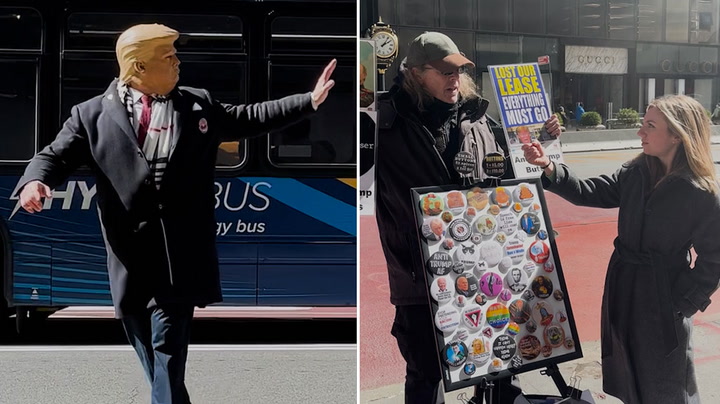Palestinian President Mahmoud Abbas has pleaded with the US to stop Israel from attacking the Gaza border city of Rafah – saying he expects an assault to begin within days on an area where more than a million people have taken refuge.
Mr Abbas, who heads the Palestinian Authority (PA), said that the US is the only nation capable of halting Israel’s plans for an assault on the southern city, which would force much of the Palestinian population to flee. At least half of Gaza’s 2.3 million residents are believed to be sheltering in Rafah.
“We call on the United States of America to ask Israel to not carry on the Rafah attack. America is the only country able to prevent Israel from committing this crime,” Mr Abbas told a special meeting of the World Economic Forum in the Saudi capital Riyadh.
Israel, which has threatened for weeks to launch an all-out assault on the neighbourhood, saying its goal is to destroy Hamas’s remaining battalions there, stepped up airstrikes on Rafah last week.
The UK, the US and several other nations have called on Israel not to go into Rafah, fearing what will happen to those gathered there. Israel has moved from north to south in its near-seven-month war on Hamas, which runs Gaza. And many residents have been forced further south as the Israeli military has advanced.
“What will happen in the coming few days is what Israel will do with attacking Rafah because all the Palestinians from Gaza are gathered there,” Mr Abbas said, adding that it would only take a “small strike” on Rafah to force the Palestinian population to flee the Gaza Strip.
“The biggest catastrophe in the Palestinian people’s history would then happen,” Mr Abbas said.
He reiterated that he rejects the displacement of Palestinians into Jordan and Egypt and voiced his concern that once Israel completes its operations in Gaza, it will then attempt to force the Palestinian population out of the occupied West Bank, which the PA controls parts of, and into Jordan.
Israel launched its offensive in Gaza after Hamas led a brutal attack on southern Israel on 7 October in which around 1,200 people were killed and another 250 taken hostage. More than 34,000 Palestinians have been killed in the aerial bombardment, ground assaults and blockade that has followed, according to the Gaza health ministry.
On Saturday, Israel’s foreign minister said Israel could suspend the incursion if a hostage deal was agreed. “The release of the hostages is the top priority for us,” Israel Katz said. Meanwhile, the Israeli military said its chief, Herzi Halevi, had approved plans to continue the war, with Israeli media saying this referred to the Rafah operation.
In a call with Israeli prime minister Benjamin Netanyahu on Sunday, US president Joe Biden reaffirmed his “ironclad commitment” to Israel’s security – but the White House said that he also “reiterated his clear position” about Israel going into Rafah.
That comes after White House national security spokesman John Kirby told ABC News that Israel “assured us they won’t go into Rafah until we’ve had a chance to really share our perspectives and concerns with them. So, we’ll see where that goes.”
Former speaker of the House of Representatives Nancy Pelosi said Mr Netanyahu “couldn’t have done things worse” in the conflict with Hamas. Speaking on the BBC’s Sunday with Laura Kuenssberg show, Ms Pelosi said: “Israel has the right to defend itself – the manner in which they are doing it is really challenging because Netanyahu has never been an agent for peace.
“I’m not a big fan of his, but he couldn’t have done things worse than tens of thousands, whatever the figure may be, of people dying, children malnourished, and the uncertainty that is there, and that’s what people are speaking out about.”
Antony Blinken, the US secretary of state, is due to travel to Saudi Arabia for talks about efforts to agree a ceasefire in Gaza and getting more humanitarian aid into the besieged strip.
It comes as a senior Qatari official urged Israel and Hamas to show “more commitment and more seriousness” in ceasefire negotiations in interviews with Israeli media, as pressure builds to reach a deal that would free some Israeli hostages.
Qatar, which hosts Hamas’s headquarters in Doha, has been a key intermediary and was instrumental, along with the US and Egypt, in helping negotiate a brief halt to the fighting in November that led to the release of dozens of hostages. But in a sign of frustration, Qatar this month said that it was reassessing its mediator role.
An Israeli delegation is expected in Egypt in the coming days to discuss the latest proposals in negotiations, and senior Hamas official Basem Naim said in a message to the Associated Press that a delegation from the militant group will also head to Cairo. Egypt’s state-owned al-Qahera TV said the delegation would arrive on Monday.
The interviews with Qatar’s Foreign Ministry spokesperson Majed al-Ansari by liberal daily Haaretz and Israeli public broadcaster Kan were published and aired on Saturday evening. Mr Ansari expressed disappointment with Hamas and Israel, saying each side has made decisions based on political interests and not with civilians’ welfare in mind. He didn’t reveal details on the talks other than to say they have “effectively stopped”, with “both sides entrenched in their positions”.
Mr Ansari’s remarks came after an Egyptian delegation discussed with Israeli officials a “new vision” for a prolonged ceasefire in Gaza, according to an Egyptian official, who spoke to the Associated Press on condition of anonymity to freely discuss developments.
The Egyptian official said that Israeli officials are open to discussing establishing a permanent ceasefire in Gaza as part of the second phase of a deal. Israel has refused to end the war until it defeats Hamas. The second phase would start after the release of civilian and sick hostages, and would include negotiating the release of soldiers, the official added. Senior Palestinian prisoners would be released and a reconstruction process launched.
Negotiations earlier this month centred on a six-week ceasefire proposal and the release of 40 civilian and sick hostages held by Hamas in exchange for freeing hundreds of Palestinian prisoners in Israeli jails.
Reuters and Associated Press contributed to this report
Source: independent.co.uk



